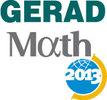HEC Montréal, Canada, May 6 - 8, 2013
2013 Optimization Days
HEC Montréal, Canada, 6 — 8 May 2013

TB7 Énergie et environnement IV / Energy and Environment IV
May 7, 2013 03:30 PM – 05:10 PM
Location: Hélène-Desmarais
Chaired by Roman Cada
3 Presentations
-
 03:30 PM - 03:55 PM
03:30 PM - 03:55 PMA Model System for Household Vehicle Holding, Type and Usage: A Continuous Probit Approach
This paper proposes a joint discrete-continuous model to estimate household choices on vehicle holding, type and usage. The model is estimated using the 2009 US National Household Travel Survey and a secondary dataset on vehicle characteristics. The discrete components are respectively, multinomial probit for vehicle holding and multinomial logit for the vehicle type/vintage sub-models. A flexible estimation approach with unrestricted correlation between the discrete and the continuous parts is proposed to estimate the joint discrete continuous models. The estimated model contains a number of policy variable that can be applied to predict changes in the household decisions on vehicle holding and miles driven, in response to the evolution of social societies, living environment and transportation policies.
-
 03:55 PM - 04:20 PM
03:55 PM - 04:20 PMANNULÉE/CANCELLED: The Integration of Power as a Criteria in Decision-Making Processes to Improve Integrated Water Resources Management Implementation Over Shared Watershed
This research suggests how the assessment of power variables involved the informal interactions between the riparian countries over a watershed could improve the applicability of integrated water resources management framework and further on, features preferred policies that would improve the legitimacy of the watershed institution and the collaborative effort of countries sharing the watershed.
-
 04:20 PM - 04:45 PM
04:20 PM - 04:45 PMParallelization of Multi-Cycle Loading Design for Nuclear Reactors
Optimization of loadings in reactors is a task of nonlinear combinatorial optimization. It is possible to parallelize optimization of every cycle, but also to use a parallel "preprocessor" phase for estimating parameters of next cycle to speed-up optimization. We present a mathematical background and also several results of a new code tau-Athena.

